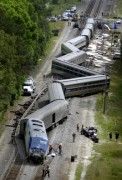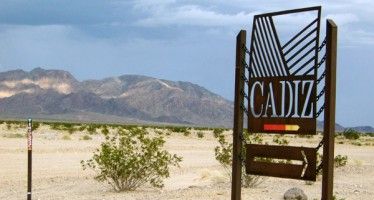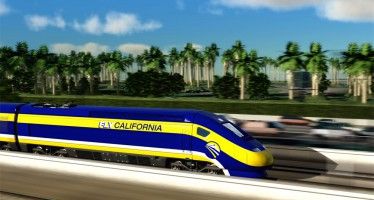Most East Coast media misjudge CA bullet train
Feb. 19, 2013
By Chris Reed
 The immense perception gap between East Coast and West Coast journalists when it comes to reporting on the Golden State was never in sharper relief than in 2003. If you were in California, the recall of Gov. Gray Davis felt like a political earthquake, a sign of vast public discontent and — at least if you liked the recall — an affirmation of the value of direct democracy.
The immense perception gap between East Coast and West Coast journalists when it comes to reporting on the Golden State was never in sharper relief than in 2003. If you were in California, the recall of Gov. Gray Davis felt like a political earthquake, a sign of vast public discontent and — at least if you liked the recall — an affirmation of the value of direct democracy.
To lazy East Coasters, it was an opportunity to paint Californians as flakes. When I whined to Boston Globe columnist Brian McGrory about his extroardinarily superficial column on the recall, he replied with a condescending, contemptuous email.
This disconnnect may be emerging on California’s bullet train. On this coast, the Los Angeles Times editorial page may be gung ho, and some other editorial pages are still all aboard. But it’s difficult to remember the last in-depth piece of any kind in the news pages of any California newspaper that didn’t carry the implication the California High-Speed Rail Authority was poorly run and unrealistic and that the project was on track for boondoggle status. Journalists are pretty liberal in general, but they’re also front-runners, in a sense. The non-pundits don’t want to seem to back losers, so coverage has turned negative as the insanity of the project has become clear.
Mr. ‘Wonkblog’ gives his blessing
 But on the East Coast, the extent of Cali’s bullet train folly hasn’t really sunk in. The New York Times’s editorial page, whose writers show zero sign of having followed what’s actually happened in the Golden State, is in the tank. But so is the rising young media star Ezra Klein, who writes the heavily read Wonkblog column for the Washington Post and is a Bloomberg News columnist and MSNBC commentator. There has arguably never been an American pundit who in his 20s already has enjoyed more success and access to a bigger audience than Klein. Here’s what he had to say in a recent lengthy Post blog about President Obama’s accomplishments to date:
But on the East Coast, the extent of Cali’s bullet train folly hasn’t really sunk in. The New York Times’s editorial page, whose writers show zero sign of having followed what’s actually happened in the Golden State, is in the tank. But so is the rising young media star Ezra Klein, who writes the heavily read Wonkblog column for the Washington Post and is a Bloomberg News columnist and MSNBC commentator. There has arguably never been an American pundit who in his 20s already has enjoyed more success and access to a bigger audience than Klein. Here’s what he had to say in a recent lengthy Post blog about President Obama’s accomplishments to date:
“A partial accounting of Obama’s first term reveals more accomplishments than most presidents secure in two. The health-care law, of course, is almost certainly the most significant piece of social policy passed since the Great Society. The rescues of the financial and auto sectors, though begun under President George W. Bush, were mostly carried out and completed under Obama. The Dodd-Frank financial reforms included the creation of the Consumer Financial Protection Bureau. The stimulus financed long-term investments in everything from weatherization to electronic medical records and high-speed rail.“
The bolding is mine. I acknowledge that all the other things that Klein lists can be touted by liberals as achievements, even if conservatives disagree. People value different things. But Klein’s inclusion of high-speed rail as an Obama triumph — a funding category where by far the most federal money has gone to California — amounts to an indictment of his credibility. As I noted earlier, the newsrooms of California newspapers have turned on the bullet train because they worry about their reputations. Klein should worry about his, too, if he touts this fiasco.
Post editorial page vs. Post blogger
As it turns out, the editorial page of a major East Coast newspaper also sees its credibility at risk if it cheers for high-speed rail. And it turns out to be the newspaper that has Ezra Klein as a full-time employee — The Washington Post. This is from a Post editorial in November 2011:
“Things just went from bad to worse for high-speed passenger rail in California. After the Golden State’s voters approved a $9 billion bullet-train bond issue in 2008, officials said they could build an 800-mile system by 2020, for $35.7 billion. The cost projection now, as issued by the state Nov. 1: $98.5 billion, with a completion date of 2033.
“Time to pull the plug, right? Not according to Gov. Jerry Brown (D). The new ‘business plan is solid and lays the foundation for a 21st-century transportation system,’ he said. Equally upbeat, Transportation Secretary Ray LaHood offered Mr. Brown his congratulations on ‘a sound, step-by-step strategy for building a world-class high-speed rail network.’
“This is unreal. Apart from the bond issue and $3.6 billion in federal funds already in hand, the cash-strapped state hasn’t credibly identified a source of funds for the system. The new report basically repeats previous assertions that, if California builds, federal and private-sector dollars will come. This is wishful thinking in an era of massive federal deficits, and if the opportunities for the private sector were really so great, where are the companies clamoring to invest?”
Yes, since then Jerry Brown has come up with a plan that purportedly shaves $30 billion off the cost of the project. But the complaints the Post went on to make about the stupidity of building the first segment in the Central Valley hold up as well as ever:
“U.S. and California officials tout this lonely corridor as the “spine” of a system that will connect big cities later on. After all, they argue, the interstate highway system started in Kansas. But that project had a dedicated funding source from the get-go: the federal highway trust fund, supported by fuel taxes.
“More realistically, Sacramento’s Legislative Analysis Office calls the Central Valley starting point a ‘big gamble.’ In the all-too-likely event that funding for the rest of the system never materializes, the report adds, ‘the state will be left with a rail segment unconnected to major urban areas that has little if any chance of generating the ridership to operate without a significant state subsidy.’ It would be a train to nowhere, but at least it would go nowhere fast.
“As questionable as this project is, we would have less business objecting if the only money at risk was California’s. But the Obama and Brown administrations are talking about devoting the nation’s funds to what looks more and more like a boondoggle. If the president and governor won’t slam on the brakes, then Congress or the California legislature must find a way to prevent the spending. Somebody, please, stop this train.”
So how could Washington wunderkind Ezra Klein not grasp the basic points his employer makes? If you have a reputation as a very shrewd public policy analyst, that’s vastly difficult to square with being a bullet-train enthusiast.
The final twist: Klein was born in Irvine and went to UCLA. It didn’t take long for him to adopt the default East Coast media disdain for actually studying how the Golden State works before pretending to understand its twists and turns.
Related Articles
Sacto water deputies patrolling for water wasters
Sacramento water police are on patrol. If the rule of law isn’t enough to control Sacramento’s citizens, government officials have turned
Water deal turnoff helped parch L.A.
Los Angeles sure could use extra water right now. But in 2002 the water-locked city forfeited a Golden State opportunity to buy drought-relief
Massive transportation bill has no $ for CA bullet train
California’s controversy-plagued bullet train project got a major boost from the Obama administration and Congress in 2009 when more than




